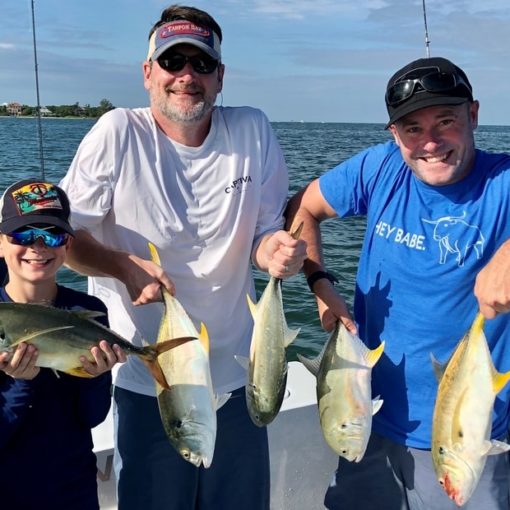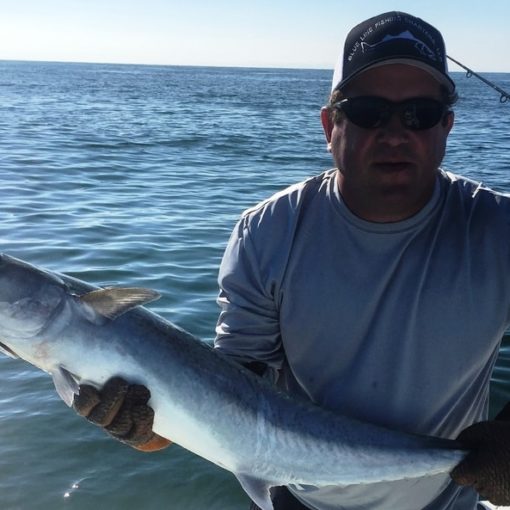As its name suggests, the Goliath Grouper is a giant of a fish found in the Gulf of Mexico. Its scientific name is Epinephelus itajara. Other common names include giant seabass, a clue that they belong to the sea bass family. Adult goliath groupers can reach lengths of over 8 feet and weigh in at nearly 800 pounds. However, most of them are more typically around the 400-pound mark.
Fancy a close up glimpse of this, one of the world’s biggest fish species? At Blue Line Fishing Charters Cape Coral FL we run custom trips to known goliath grouper habitats. Experience them in all their natural glory.
About Goliath Grouper
Goliath groupers are a blotchy dark yellowy grey brown in color with light patches over their body. This coloring cleverly mimics the dappled effects of sunlight shining through water. Perfect camouflage for the shallow tropical coral reefs that are their preferred habitat in fact!
As a species, Atlantic Goliath Groupers are closely related to the Pacific Goliath Grouper. The latter is found only along the tropical eastern shores of the Pacific Ocean. The two were considered one species until recently when slight genetic differences between them were discovered. Behaviorally and appearance wise though they are almost identical.
Goliath Groupers And Their Habitat
Adult goliath groupers are solitary individuals, preferring to live alone in their patch of zealously guarded ‘turf’. Their favorite habitats include coral reefs, caves, ledges and rocky outcrops in shallow tropical water. They can also live comfortably in brackish water. Young groupers are often found close to oyster bars in mangrove and other estuarine environments. Oysters are a young gropers favorite food!
Groupers are ambush predators that generally swallow their prey whole. The larger they are, the bigger their prey, and some of that prey is pretty impressive! Goliath groupers have been known to eat large sharks! However, their main diet consists of crustaceans, small sea turtles, octopus, and fish.
Goliath Groupers Are Endangered
Unfortunately, the goliath grouper is on the International Union for Conservation of Nature’s (IUCN) Red List of Threatened Species. Over harvesting last century reduced their total global population by around 80%. However, scientists also believe goliath gropers have likely never been particularly prolific because it is an apex predator. Apex predators sit at or near the top of food chains and typically have very few predators themselves.
Harvesting goliath groupers has been banned in the US since 1990. They may now be caught for sport but must be released unharmed. Fortunately their numbers are now quickly recovering. However, they are a very slow growing fish with a low reproductive rate so for the moment they remain protected.
Goliath Grouper – Aggregate Spawners And Protogynous Hermaphrodites
Like many other marine species, goliath groupers are aggregate broadcast spawners. The generally solitary adults come together in a large group, called an aggregation, at spawning time. Spawning season for goliath groupers is from July to September and spawning typically happens just after a full moon.
During a broadcast spawn, sperm and eggs are released into the water at the same time. Fertilization happens externally in the water. The fertilized eggs are pelagic, meaning they float in the water, and are dispersed by the currents. Tiny kite-shaped larvae hatch and head to safe nursery environments like coastal tidal pools. They’ll remain there until they’re big enough to move into mangrove and other estuarine environments close to oyster bars.
Goliath groupers are thought to be protogynous hermaphrodites. They start life as females and eventually change to males. However, exactly when they make this change is uncertain. What is known though is that the largest specimens are always males. This is the reverse of the tarpon and snook, which begin life male and ends up female.
Where To Find The Best Charter Fishing Cape Coral Offers
If you’re keen on hooking up with one of these giants of the seas, contact us. We are dedicated to providing the best custom fishing charter that Cape Coral FL has to offer!





